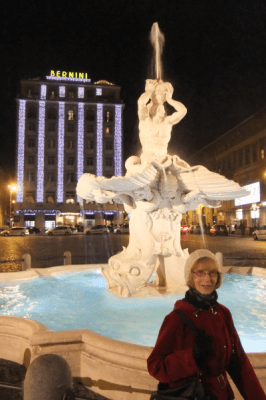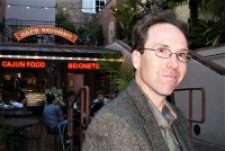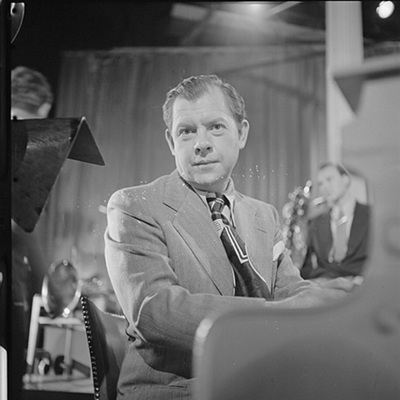.
.

The author’s mother at Rome’s Piazza Barberini
.
.
Un Euro?
By
Dan Morey
.
…..Mother and I took the metro to the Piazza del Popolo, then boarded a northbound tram for the Parco della Musica, where the Rome Jazz Festival was being held.
…..We arrived early, and went into the bar. It was hip and colorful with mod plastic chairs and a smattering of foodstuffs under a glass counter. We picked out two panini and asked for them calde, or hot. The bartender put the sandwiches in a griddler for a couple minutes, then placed them, steaming, on plates. Mother found a table, and I handed the man a twenty-euro bill.
…..“Un euro?” he said.
…..I thought he was asking to keep a euro tip, so I replied, “Si.” He didn’t move. “Si,” I said again. Still he waited, his hand hovering over the till.
…..“Un euro?” he repeated.
…..“Si,” I said.
…..This went on for an embarrassingly long time, until he finally put the bill in the register and gave me my change. From that change I deposited a euro into the tip jar. He responded with a look that implied he’d rather put a handful of cat droppings in his pocket than my coin. It was only after I’d finished half my sandwich that I realized he’d been asking me for a euro to make the change an even ten-euro bill.
…..As an American, I found this behavior to be highly abnormal. I’m used to bartenders intentionally overloading me with dollar bills in hopes of getting a few of them back in tips. In Rome, cashiers abhor the very notion of uneven or exorbitant change and will gladly forego personal profit in favor of soothing their mathematical neurosis.
…..As the café at the Parco della Musica was my first Roman change incident, I foolishly imagined that I had somehow enlightened the bartender—that my euro tip had started a mental chain reaction that would end in a light-bulb moment: “Ah!” he’d think. “So this is why I never get any tips—I don’t give them any small change!”
…..Thanks to me, this humble panini-slinger’s yearly income would increase by fifteen percent. I was quickly disillusioned, however, when we passed by the counter on the way to the auditorium. A woman was standing there, digging in her purse, and I distinctly heard the bartender say, “Un euro?”
…..I’d been told that jazz was still big in Europe, and it’s true. The show sold out (on a Thursday night) and the seats were full of young people. The last American jazz festival I’d attended was the “Sweet and Hot” in Los Angeles. Besides the hired swing dancers, I was the only one under sixty in attendance. Between performances, I hung out in the lounge at the airport Marriott and chatted with single ladies over Manhattans and Sidecars.
…..“These bands are okay,” one of them confided to me. “But I miss Paul Whiteman.”
…..In Rome, I witnessed an apparently normal eighteen-year-old girl stand up and whistle at an alto-saxophonist.
…..Francesco Cafiso, the Sicilian saxophone phenom, blew through stellar renditions of “Mack the Knife” and “Autumn Leaves.” By the time he got around to “What is This Thing Called Love,” I was smitten with the entire continent. When the concert was over, I drifted, insensibly, into the street with Mother in tow.
…..“Hey,” she said. “Nobody’s at the tram stop.”
…..I ambled along, humming “Perdido” under the Roman moon. She asked me where I thought I was going.
…..“Tram,” I said.
…..“I told you, there’s no one there.”
…..I went over and read the schedule.
…..“Well?” said Mother.
…..“Apparently, the last tram is at nine o’ clock.”
…..“It’s eleven-thirty!”
…..“Yes.”
…..“Well, what do we do?”
…..My jazz-jarred brain attempted to formulate a solution, but all it could come up with was “Perdido. Perdido, perdido, perdido.”
…..“What about the bus?” said Mother.
…..Before we reached the stop, a bus pulled up, sucked in all the people, and barreled away.
…..“Whoops,” I said.
…..“Whoops?” said Mother. “Whoops? Didn’t you plan this out? Didn’t you know the trams would stop running?”
…..“There’s no reason to get excited. We’ll just catch the next bus. I think they run until midnight.”
…..“You think they run until midnight? You think?”
…..“Stop saying everything twice. It isn’t helping.”
…..Mother paced around while I squinted at the timetable.
…..“I’m asking this lady,” she said, striding towards a defenseless woman unlocking her car.
…..“Excuse me,” said Mother. “We need to get back to the Piazza del Popolo. Will this bus take us there?”
…..“I don’t think so,” said the woman, in perfect English. “But I can check.”
…..She came over and stared at the schedule with me.
…..“Hello,” I said.
…..“Hello.”
…..“We missed the tram.”
…..“Yes.”
…..After a period of intense scrutiny, the woman put her finger on a route number and said, “Take this bus four stops.” She moved her finger. “And then transfer to this one. It will drop you at the Piazza del Popolo.”
…..“Thank you,” said mother.
…..“Sure,” said the woman, smiling. “Ciao.”
…..Before we could board the bus, I had to walk over to a tobacco shop and buy tickets. I told the cashier what I wanted and gave him a ten euro note.
…..He looked at me with eyes full of hope and said, “Un euro?”
.
.
___
.
.

Dan Morey is a freelance writer in Pennsylvania. He’s worked as a book critic, nightlife columnist, travel correspondent and outdoor journalist. His writing has appeared in Hobart, Harpur Palate, McSweeney’s Quarterly, decomP and elsewhere, .and he’s been nominated for a Pushcart Prize. Find him at .danmorey.weebly.com.
.
.
Listen to Enrico Rava and Paolo Fresu play “Doodlin'” from the 1999 album Shades of Chet
.
.
.














































